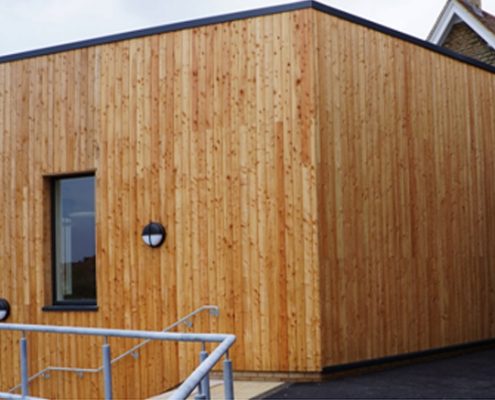

NORCLAD® EUROPEAN & UK LARCH (LARIX EUROPAEA)
This is an indigenous specie which grows in various parts of Britain which gives an improved carbon footprint to local projects and developments over Siberian Larch. British grown Larch is naturally moderately durable softwood in view of its high resin content with a colour that ranges from a light-dark brown heartwood to a white sapwood.
Compared to Siberian Larch, British grown Larch is typically warmer in appearance having a rich heartwood colour, it has a greater number of knots and perhaps more grain character. It is straight grained which can lead to boards splitting and in view of its high resin content, which can lead to difficulties in applying a protective coating or finish.
Knots are brown and can be scattered and frequent, and they may loosen and weep resin for 12-18 months. It will colour down to a silver grey if it is not protected as soon as installation is complete with a good quality semi or fully translucent UV-radiation protective coating.
It is a very strong and hard-wearing wood. This specie is ideal for traditional cladding profiles where it is used in its Unseasoned or wet state. It is not suitable for machined profiles as the knots tend to loosen and fall out during drying and machining.
More Information
Wood Type: Softwood.
Origin: Extensively planted in many European Countries and the U.K.
Sustainability: Sourced from well managed forests – FSC certified available on request
Availability: Sawn and planed products in a wide range of thicknesses, widths and profiled patterns.
Colour: A pale Red/Brown.
Quality: Joinery and Structural.
Typical end uses: External Structural application, Cladding, Flooring, and Joinery.
Durability: Slightly-Moderately Durable.
Density: 550 kg per m3 at 12% moisture content.
Dimensional stability: It has a tendency to distort when wet or not dried, but once dry, is generally stable.
Fixings: We would recommend only top quality stainless steel fixings are used to avoid corrosion of fixings and blue staining of the profile.
Ring shank nails are preferable to normal wire nails as ring shank nails offer extra grip. We would suggest the length of the nail should be two and a half times the thickness of the board. The nail should penetrate the batten by at least 32mm.
Strength & Working properties: It is one of the hardest softwoods available (50% harder than Scots Pine) and about the same strength as Scots Pine.
It can be sawn and machined fairly well however it can split on nailing so pilot drilling of fixing holes is recommended particularly at board ends. There is a tendency for knots to be loose which can be a problem.
Sizes and lengths available: 25mm, 38mm, 50mm, 63mm & 75mm Thicknesses//100 mm wider 1.8 – 4.8 metres and longer.
Get a Quote
Contact us for more information, a sample or a prompt quotation.



